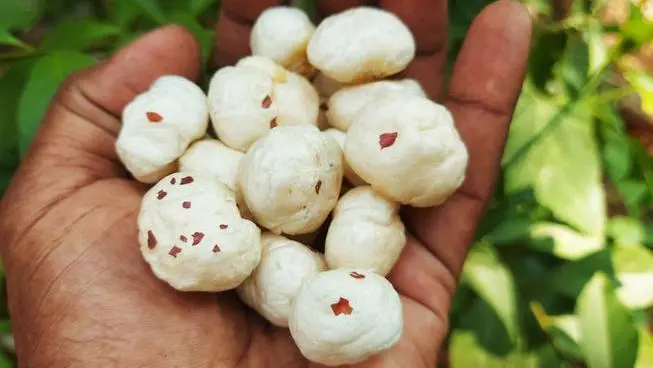Like his father and grandparents, Phooldev Shahni once had to venture into the pond every day to earn a living.
“I used to immerse myself in 7-8 feet deep water every day. After nine to 10 minutes, I used to come up with the water to breathe,” explains Shahni, who hails from Bihar.
He used to bring the lotus seeds out of the dirty water.
These nuts are called makhana or fox nuts. They contain many nutrients. They are rich in vitamin B, protein and fiber. Some refer to them as ‘superfood’.
Makhana is mostly eaten as a snack. It is also used in a variety of dishes.
90% of the world’s makhana is in the state of Bihar.
The leaves of this large, round plant float on the water. But the seeds are formed in underwater nuts. Collecting them is a very laborious task.
“When you step into the water, the mud goes into the ears, eyes, nose and mouth. This causes many people to have skin problems. Also there are thorns all over this plant. When the grains are removed, the whole body gets cut off,” says Shahni.
However, in recent times, farmers have changed the method of cultivation of makhana. These plants are now grown in fields and in shallow water ponds. It is also cultivated in water that is feet deep.
“It’s still a very difficult task. But this is a traditional profession for us. I am proud of that. I have three children. I will ensure that one of our boys continues the legacy of working on this farm,” said Shahni.
Dr Manoj Kumar is one of the prominent personalities behind the changes in the cultivation of lotus seeds.
Ten years ago, he realised that it would be difficult to expand their cultivation in deep ponds.
Manoj Kumar, who is currently a senior scientist at the National Research Centre for Makhana (NRCM), has been instrumental in developing a method of cultivating the crop even in low-water-deep fields.
A lot of people have been implementing that technique for the last four to five years.
“With our innovations, the cultivation of lotus seeds has now become much easier than the crops grown on ordinary land. It is enough if this crop now has one foot deep water. This will ensure that farmers don’t have to work for hours in deep water,” Manoj Kumar explained.
The company he works for has done a lot of experiments on lotus seeds. Developed a much better, higher yielding bend. Manoj Kumar said this has tripled the income of farmers.
He added that makhana cultivation has helped some farmers in dealing with floods and uncertain weather conditions in Bihar.
Now the NRCM is working on developing machines that will make makhana cultivation easier. The company’s innovations are attracting a lot of farmers.
In 2022, makhana was cultivated in 35,224 hectares (87,000 acres). The area under cultivation has almost tripled as compared to the previous 10 years.
